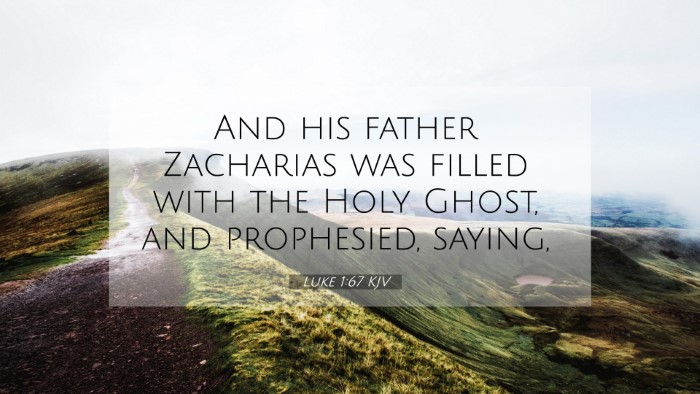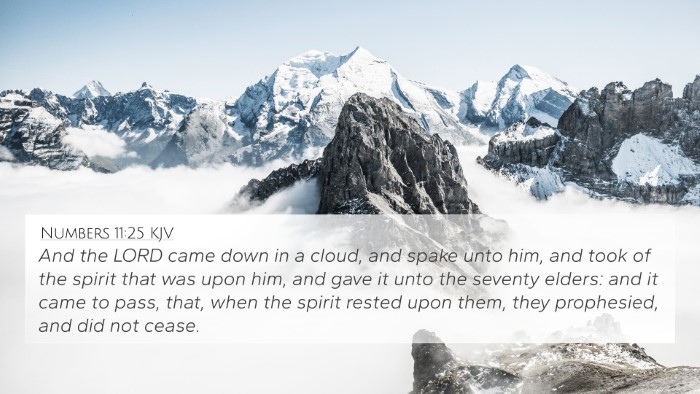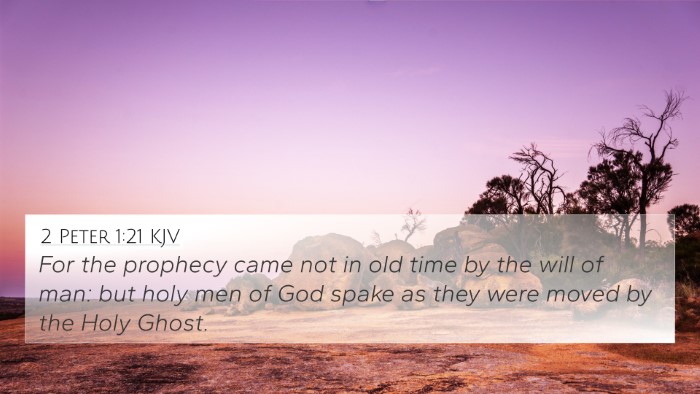Understanding Luke 1:67
The verse Luke 1:67 states:
"And his father Zechariah was filled with the Holy Spirit and prophesied."
This verse captures a pivotal moment of praise and prophecy following the birth of John the Baptist. It emphasizes the divine inspiration that accompanies Zechariah's words, marking an important event in the biblical narrative.
Context and Overview
To grasp the full meaning of Luke 1:67, it is essential to understand the context leading up to this prophetic declaration:
- Historical Background: Zechariah, a priest, was previously rendered mute due to disbelief when he received the angel Gabriel's announcement of his son’s birth.
- Divine Revelation: Upon the birth of John, Zechariah's mouth is opened, fulfilling the angel's message and confirming God’s promises.
- Spiritual Significance: The filling of the Holy Spirit indicates divine empowerment to proclaim God's message, a rare and significant occurrence in biblical narratives.
Commentary Insights
Insights from several public domain commentaries shed light on the implications of this verse:
- Matthew Henry:
Henry emphasizes the filling of the Spirit as a pattern for believers, noting that true prophecy stems from divine inspiration, not human wisdom.
- Albert Barnes:
Barnes highlights the importance of Zechariah's prophecy, linking it to the broader narrative of redemption, asserting that the arrival of John heralds the coming of the Messiah.
- Adam Clarke:
Clarke points to the fulfillment of Old Testament prophecies through John, indicating that this moment signals God's active engagement in human history.
Thematic Connections
Luke 1:67 not only stands alone but also engages in rich inter-biblical dialogue. The themes of prophecy and divine inspiration resonate throughout scripture:
- Acts 2:17-18:
Peter quotes the prophet Joel, illustrating the outpouring of the Spirit upon God's people, similar to the empowerment Zechariah experiences.
- Matthew 2:5-6:
The prophetic utterance concerning the birthplace of Jesus shows how God unfolds His plan through prophetic voices.
- Isaiah 9:2:
This prophecy about the coming light parallels John’s role in preparing the way for Jesus, signifying the fulfillment of God's plan.
- Malachi 3:1:
References John the Baptist as the messenger who will prepare the way, anchoring Luke 1:67 in prophetic tradition.
- Matthew 11:11:
Jesus’s affirmation of John as the greatest prophet serves as a culmination of the prophecies surrounding his birth.
- John 1:23:
John the Baptist’s self-identification as a voice echoing Isaiah signifies his prophetic role as foretold.
- Luke 4:18:
Jesus, filled with the Spirit, proclaims His mission, paralleling the prophetic filling of Zechariah and John.
Cross-Referencing Insights
Cross-referencing biblical texts brings greater depth to understanding Luke 1:67, establishing connections that enhance the study of scripture:
- Tools for Bible Cross-Referencing: Utilizing a bible concordance allows for the easy discovery of prophetic texts and their interrelations.
- Identifying Connections: Recognizing how John the Baptist fulfills the role of the messenger set forth in the Old Testament enriches understanding.
- Comparative Studies: Analyzing the Gospels in parallel reveals variations in how each author frames John’s ministry.
- Thematic Studies: Exploring thematic links between John’s birth, his ministry, and Jesus’s mission illustrates the cohesive narrative of salvation history.
Conclusion
In conclusion, Luke 1:67 serves as a rich testimony to the workings of the Holy Spirit, the fulfillment of prophecy, and the anticipation of the coming Messiah. Its connections to other scriptural passages highlight a tapestry of divine revelation that calls for believers to recognize and engage with God's unfolding plan throughout history.
By employing bible cross-reference guides and tools, one can explore the connections between Bible verses to deepen understanding of God's Word and its implications for faith today.








